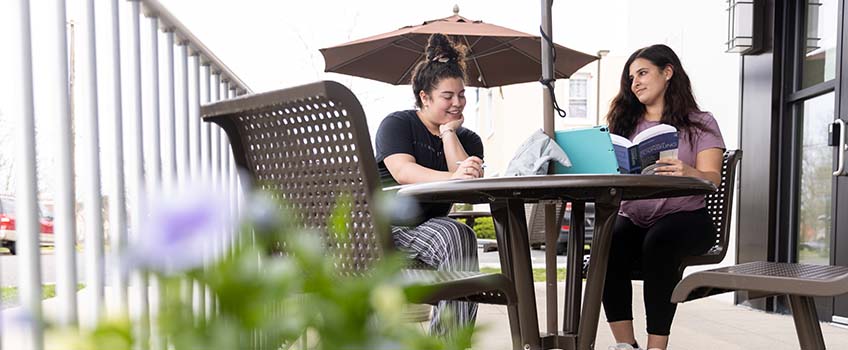M.A. in Counseling

Stockton University's Master of Arts in Counseling program is designed to educate students about best practices in mental health and human services and train students in the skills necessary to work with clients in a variety of settings, such as hospitals, social service agencies, residential treatment centers, community mental health centers, and other organizations
Our program prepares individuals to provide evaluations, referrals, and counseling services to help people prevent or remediate personal problems, conflicts, and emotional crises. Our curriculum includes instruction in human development, psychopathology, individual and group counseling, personality theory, career assessment, patient screening and referral, observation and testing techniques, interviewing skills, professional standards and ethics, and applicable laws and regulations.
Accreditation update: The Master of Arts in Counseling program sought accreditation from the Council for Accreditation of Counseling and Related Educational Programs (CACREP) and received notice of our accreditation on August 12, 2024. The program is accredited for eight years and graduates of the program can consider themselves graduated from a CACREP program dating back to July 11, 2022. Here is our program's status on their website. Stockton was one of three institutions that received a CACREP Grant to assist with the accreditation process. The Program Chair, Dr. Sara Martino, was featured on their website.
Click here to watch our Master of Arts in Counseling Virtual Information Session.
About the Program
Program Objectives
Academic Objectives:
The Master of Arts in Counseling program aims to educate students regarding best practices in counseling. Curriculum focuses on the eight core areas delineated by CACREP standards: professional counseling orientation and ethical practice, social and cultural diversity, human growth and development, career development, counseling and helping relationships, group counseling and group work, assessment and testing, research and program evaluation.
The objectives for the program are specifically:
- To provide meaningful educational experiences to prepare graduates with foundational skills, critical thinking ability, and dedication to the counseling profession,
- To prepare graduates for employment, licensure, and certification by meeting the standards set by the appropriate accrediting and licensing agencies,
- To inspire graduates to become advocates for their clients and leaders in their profession,
- To encourage patience, sensitivity, and understanding in the delivery of counseling services to diverse communities,
- To prepare graduates for a commitment to ethical professional practice, and
- To prepare students to use research as a guide for identifying effective counseling techniques (Chwalisz, 2003).
M.A. in Counseling Student Handbook
Professional Objectives:
National certification: Graduates of the program are qualified to take the National Counselor Exam (NCE), which is administered by the National Board of Certified Counselors (NBCC). Passing the NCE exam qualifies graduates as a Nationally Certified Counselor (NCC). See the section on Accreditation below to verify the proposed program's eligibility for CACREP accreditation.
State licensure: Graduates who have passed the NCE are qualified to apply for licensure in the State of New Jersey as a Licensed Professional Counselor (LPC) after an additional 4,500 hours of supervised experience. This license allows them to work as counselors in non-profit organizations, for profit organizations, or in private practice in New Jersey.
- FAQs about the Master of Arts in Counseling program and COVID-19
- Master of Arts in Counseling Annual Report 2020
- Master of Arts in Counseling Annual Report 2021
- Master of Arts in Counseling Annual Report 2022
- Master of Arts in Counseling Annual Report 2023
- Master of Arts in Counseling Annual Report 2024
- Master of Arts in Counseling Post-graduate Data 2021
M.A. in Counseling Program Evaluation Results and Student Outcomes:
| 2024 | 2025 | |
| Number of graduates | 16 | 16 |
| Degree completion rate | 94% | 94% |
| Licensure/certification pass rate | 92% | 88% |
| Employment rates for graduates | 53% | 69% |
Curriculum
Students must complete 60 credit hours satisfying the criteria outlined below with passing grades of C or better in all courses. All students must also satisfactorily complete a 100-hour practicum and two 300-hour internships. Due to the interpersonal nature of the discipline, it is expected that all core courses will be delivered in face-to-face format, although some courses may be offered as hybrid classes.
Counseling skills will be an introduction to basic clinical skills designed to prepare
students to begin working at practicum sites. Students will be required to complete
a 100-hour practicum during the second semester of the program, including 40 hours
of direct service with clients (individual therapy or group therapy, for example).
This experience can take place in a group or private practice which is separate from
social work practicum opportunities. They will also complete two semester-long internships
consisting of 300 hours of client-related work during the third and fourth semesters
of the program. These internships should both take place at the same site and will
include group supervision by faculty as well as supervision with an on-site supervisor.
Each semester of internship will include 120 hours of direct client contact and 180
hours of indirect client services.
Master of Arts in Counseling Curriculum Worksheet
| Year 1- Fall Semester-15 credits | Year 1- Spring Semester- 15 credits |
|
COUN 5110 Pre-Practicum
|
COUN 5135 Assessment and Testing
|
| Year 2- Fall Semester-15 credits | Year 2- Spring Semester-15 credits |
|
COUN 5130 Lifespan Development
|
COUN 5225 Career Counseling
|
|
Elective Courses COUN 5520 Counseling Children and Adolescents |
|
For course description, please visit the University's Course Catalog.
Practicum/Internship Resources
- Student Handbook
- Clinical Handbook 2025-2027
- Site Supervisor Handbook 2025-2027
- Clinical Mental Health Site Approval Form
- Practicum Application
- Internship I Application
- Internship II Application
- Site Supervision and Clinical Placement Agreement (Contract)
- Annual Report 2020
- Clinical Paperwork Checklist
- Site Supervisor Vita Template
Admissions Criteria
Application Deadline
Fall 2026: Deadline February 16, 2026
Prerequisite/Matriculation Requirements
- Baccalaureate degree from a regionally accredited institution of higher education
- Minimum undergraduate GPA of 3.0
- Incoming students must have prerequisite skills and knowledge in statistics and experimental psychology as well as at least one course in either child development or personality psychology. These matriculation requirements can be met by courses taken at the undergraduate or graduate level with earned grades of B or better.
Admissions Requirements
- Click here to start your application.
- Application fee: $50 (non-refundable), submitted with your online application
- Graduate application essay
- Three letters of recommendation sent electronically via the online application
- Graduate Record Examination (GRE) scores sent electronically to school code: 2889
- Scores must have been taken within the last 10 years
- GRE requirement is waived for those applicants with a cumulative GPA of 3.51 or higher, and is also waived for master's degree holders.
- Resume
- Official transcripts from all colleges and universities attended must be sent directly
to the Office of Graduate Admissions electronically, by mail, or in-person. The Office
of Graduate Admissions will retrieve Stockton transcripts on your behalf.
By mail:
Office of Graduate Admissions, N-Wing 007a
101 Vera King Farris Drive
Galloway, NJ 08205-9441
Electronically:
gradschool@stockton.edu -
To review international applicant deadlines and admission criteria, please click here.
Frequently Asked Questions
No, however students must have prerequisite skills and knowledge in statistics and experimental psychology as well as at least one course in either child development or personality psychology.
Yes, with the exception of master's degree holders or those with a cumulative GPA of 3.51 or higher. The Graduate Entrance Exam must have been taken within the last 10 years.
Students are admitted in the Fall semester only.
Classes are held in the afternoon and evenings at Stockton's Kramer Hall Instructional Site in Hammonton, NJ.
Yes. To register, students must complete the online Graduate Non-Matriculated Student form.
Stockton may accept up to 9 credits that sufficiently match corresponding Stockton courses, provided that the grade earned is a 3.0 (B) or better. Clinical courses are exempt from transfer.
A Graduate Transfer Equivalency Form must be submitted at the time of application when requesting transfer credits.
After all applications have been reviewed, the most qualified applicants are invited to interview in mid-March. After interviews are completed, final decision letters will be mailed no later than May 1st but these timelines can be adjusted based on circumstances (weather, emergencies, etc.). Please note that meeting the minimum requirements does not guarantee interview or admission to the M.A. in Counseling program.
The Master of Arts in Counseling program sought accreditation from the Council for Accreditation of Counseling and Related Educational Programs (CACREP) and received notice of our accreditation on August 12, 2024. The program is accredited for eight years and graduates of the program can consider themselves graduated from a CACREP program dating back to July 11, 2022. Here is our program's status on their website. Stockton was one of three institutions that received a CACREP Grant to assist with the accreditation process. The Program Chair, Dr. Sara Martino, was featured on their website.
Apply today. If you have further questions you can Request More Information or call the Office of Graduate Admissions at (609) 626-3640 or E-mail gradschool@stockton.edu.
Dr. Sara Martino
Professor, Director, MA in Counseling program



